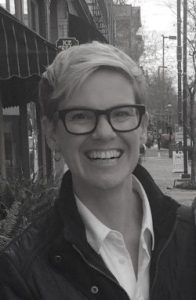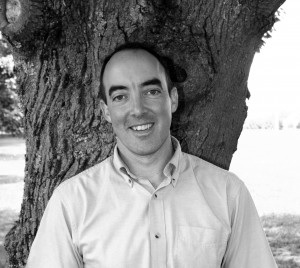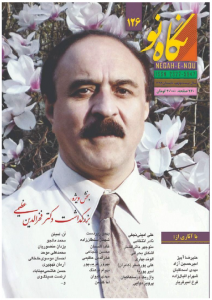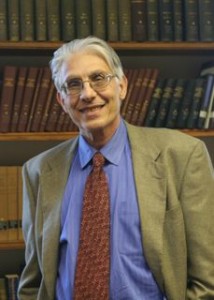 To commemorate the 75th anniversary of diplomat George Kennan’s “Long Telegram,” the Wilson Center’s History and Public Policy Program published an essay by UConn History’s own Board of Trustees Distinguished Professor Frank Costigliola. Professor Costigliola edited 2014’s The Kennan Diaries and published articles and essays about Kennan’s decades-long relationship with Russia and the Soviet Union. His essay, “My Voice Now Carried”: George F. Kennan’s Long Telegram,” is an excerpt from Professor Costigliola’s forthcoming book on Kennan. You can find Professor Costigliola’s excellent essay at the Wilson Center’s Sources and Methods blog.
To commemorate the 75th anniversary of diplomat George Kennan’s “Long Telegram,” the Wilson Center’s History and Public Policy Program published an essay by UConn History’s own Board of Trustees Distinguished Professor Frank Costigliola. Professor Costigliola edited 2014’s The Kennan Diaries and published articles and essays about Kennan’s decades-long relationship with Russia and the Soviet Union. His essay, “My Voice Now Carried”: George F. Kennan’s Long Telegram,” is an excerpt from Professor Costigliola’s forthcoming book on Kennan. You can find Professor Costigliola’s excellent essay at the Wilson Center’s Sources and Methods blog.
Faculty
Nancy Shoemaker Profiled for Authors in Conversation Series
H-SHEAR (the network for historians studying the early American republic, during the period 1775 to 1860), in association with Cornell University Press, will hold a U.S. in the World Series Authors in Conversation event, “National Imaginaries and Identities in the Global 19th Century.” The event is a discussion of The Greek Fire: American-Ottoman Relations and Democratic Fervor in the Age of Revolutions, by Maureen Santelli, and Pursuing Respect in the Cannibal Isles: Americans in Nineteenth-Century Fiji, by UConn History’s own Professor Nancy Shoemaker. Santelli and Shoemaker will be joined by Judy Tzu-Chun Wu.
The conversation will happen on Friday, March at 12 PM EST. It will occur on Zoom and you must register to attend. You can do so here.
Manisha Sinha Articles Published by CNN and NY Review of Books
 UConn History’s own Professor Manisha Sinha is no stranger to having her work appear in print and read by large audiences. But this week, Professor Sinha had articles published in not one, but two places: CNN and The New York Review of Books.
UConn History’s own Professor Manisha Sinha is no stranger to having her work appear in print and read by large audiences. But this week, Professor Sinha had articles published in not one, but two places: CNN and The New York Review of Books.
On Monday, February 1, CNN published Professor Sinha’s thoughts about Amanda Gorman’s inauguration poem, “The Hill We Climb,” and how to her, it summoned the story of enslaved early American poet, Phillis Wheatley. Professor Sinha explored Wheatley’s remarkable story, criticisms Gorman and her poem have received, and the ugly history of denying Black women access to the mainstream literary canon. Professor Sinha explained this dark history but also revealed that Gorman and her work beautifully captured the unending yet hopeful Black struggle for acceptance in American democracy.
Then on Wednesday, February 3, The New York Review of Books published Sinha’s “The Case for a Third Reconstruction.” In her essay, Sinha argued that the American Republic is always in danger whenever white supremacist sedition and violence is not confronted and defeated.
We encourage you to read both of Professor Sinha’s articles and share with friends.
Micki McElya Interviewed on NPR’s All Things Considered
Yesterday you might have heard an unmistakable voice on the radio: UConn History’s own Professor Micki McElya. Professor McElya appeared on National Public Radio’s (NPR) All Things Considered to talk about the four hundred lights, around the Lincoln Memorial, honoring the 400,000 people in the U.S. who have died from COVID-19. Across the country, many cities and states took the moment to commemorate the staggering death toll of the disease that has wrecked countless families and communities. Professor McElya spoke with All Things Considered host Mary Louise Kelly about collective mourning and how sharing grief can bring people together.
This is a wonderful interview with Professor McElya. Do yourself a favor and find five minutes today to listen. Follow the link for their conversation and share it with someone close to you.
Dexter Gabriel’s Novel Selected by NPR as Part of Their Best Books of 2020
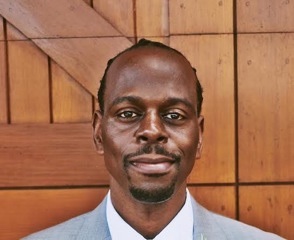 Congratulations to UConn History Professor Dexter Gabriel (under his nom de plume P. Djéli Clark) whose novel, Ring Shout, was selected by National Public Radio (NPR) to appear on their Best Books of 2020 list.
Congratulations to UConn History Professor Dexter Gabriel (under his nom de plume P. Djéli Clark) whose novel, Ring Shout, was selected by National Public Radio (NPR) to appear on their Best Books of 2020 list.
NPR Books editor, Petra Mayer, wrote:
“In P. Djéli Clark’s version of the Jim Crow South, The Birth of a Nation wasn’t just a movie – it was a summoning spell that brought the pointy headed, pale-skinned demons called Ku Kluxes to Earth to feed off the hatred of human Klansmen. Standing against the Klan are demon-hunters Maryse, Sadie and Chef, backed by the power of the ring shouts, chants led by the old Gullah woman Nana Jean. But hatred goes both ways, and Maryse must learn how to use her own before the demons do. Ring Shout is a novella, but it packs cinematic excitement, shuddering body horror, real history and wrenching emotion into its short length.”
This book sounds incredible and a must-read. Well done, Professor Gabriel, and again, congrats on this incredible honor!
Manisha Sinha’s CNN Op-Ed About 2020 Election
An op-ed by James L. and Shirley A. Draper Chair in American History Professor Manisha Sinha is prominently featured on CNN.com. The essay notes similarities and differences between the 1860 and 2020 U.S. Presidential Elections.
As Professor Sinha writes, “The one underlying commonality that binds these two historic presidential elections is the conviction that it is American democracy — rather than just opposing presidential candidates — that is on the ballot.”
Do give this excellent article a read. To read the op-ed, click the link. If you enjoy the op-ed, please share.
Brendan Kane Receives Grant to Foster Democracy & Dialogue Initiative
UConn History Professor Brendan Kane, working with Assistant Professor of Human Rights and Education Glenn Mitoma, aided CT Humanities in winning a $50,000 grant from the Andrew W. Mellon Foundation. Kane and Mitoma are co-directors of the Democracy & Dialogues Initiative (D&DI) and this Mellon grant will fund further D&DI programming. The initiative presents programming designed to provide frameworks for meaningful discussion around often difficult and divisive topics, instruction on civic processes and participation, and avenues that ensure access for all citizens to value and participate fully in our democracy.
Congratulations, Professor Kane on this incredible news. For more information about this latest honor for Professor Kane, please click the following link.
Fakhreddin Azimi’s Work Recognized by Influential Journal
In these days when conversations across political and disciplinary borders can be difficult, it is a delight to report that the summer 2020 issue of the influential Iranian socio-cultural journal Negah-e Nou featured an extensive appreciation of the work of our colleague, Fakhreddin Azimi.
In eight essays, scholars and intellectuals from Tehran, Paris, Frankfurt, and elsewhere offer assessments of his intellectual trajectory, close reviews of some of his key works, and an extended interview with him by the editor-in-chief of the journal, Ali Mirzaie. Dr. Mohammad Ali Movahhed, a member of the Iranian Academy of Language and Literature, describes Azimi as “one of the most outstandingly capable and authoritative Iranian historians since the mid-20th century.”
Dr. Nader Entekhabi writes from Paris that “Azimi is a rare figure in our modern historiography as he combines deep theoretical knowledge of different social and human science disciplines with methodical exploration of various archival and other primary sources to furnish a multi-faceted and robust account of political life in modern Iran.” Entekhabi goes on to highlight how Azimi’s writing reflects his “full immersion in classical Persian culture and literature, a reality fully discernible in every line of his magnificent prose.” As the title of Arman Nehchiri’s essay puts it, Azimi has been “Holding a Mirror in the Alley of the Wakeful” with his “subtle” analysis and his “mastery of Persian prose and distinctive style that clearly distinguish him from his peers.”
Congratulations, Professor Azimi, it is an honor to have you as a colleague. And if propriety and intellectual property allow, perhaps we someday soon might even be able to publish that interview on your path from student movements at Tehran University to teaching at the University of Connecticut.
In Memoriam: Christopher “Kit” Collier
Our colleague Christopher Collier, historian and author, passed away on March 6, 2020 at the age of 90. He was a member of the UConn History Department from 1984 until 1999. Kit, as he was known, was the official Connecticut State Historian and taught courses at UConn in early American history, Connecticut history, and Connecticut constitutional history. He was a founding member of the Connecticut Supreme Court Historical Society.
His research and writing broadened our understanding of the founding principles of American constitutional government, as well as the role of Connecticut in shaping those principles and their institutions. Among Kit’s publications are: Roger Sherman’s Connecticut: Yankee Politics and the American Revolution; Decision in Philadelphia (with James Lincoln Collier); and All Politics is Local: Family, Friends, and Provincial Interests in the Creation of the Constitution. He was well-known as the author of eight historical novels for young adults (also with James), most notably, My Brother Sam is Dead, awarded a Newberry Medal by the American Library Association.
In Memoriam: Edmund Wehrle
Longtime UConn Professor Edmund Wehrle passed away on September 20, 2019. His obituary can be found here and a reflection from Frank Costigliola follows below.
We are sad to announce the passing of Ed Wehrle, a pillar of the UConn History Department for many years. A graduate of the University of Chicago, Ed taught international history, focusing on European imperialism in Asia. His first book, on Britain, China, and the anti-missionary protests of 1891-1900, was based on the archives of the British Foreign Office and those of missionary societies. His second book, on the Great Powers in Asia, was sweeping in its coverage and critical in perspective. He was working on a detailed, deeply researched study of the Marshall mission to China after World War II.
Ed is remembered by former graduate students as someone whose love of teaching and of his students was infectious. His excitement with learning and historical inquiry made him an invaluable presence and an influential role model. Thought-provoking and super enthusiastic, he was a truly terrific human being with a great sense of humor and recognition of the absurdities of life. He helped establish the Foreign Policy Seminar and remained a loyal supporter for many years, even after his retirement in 1997. Ed was loyal, caring, and devoted to his friends, students, colleagues, and family — a real stand-up guy right to the end.
